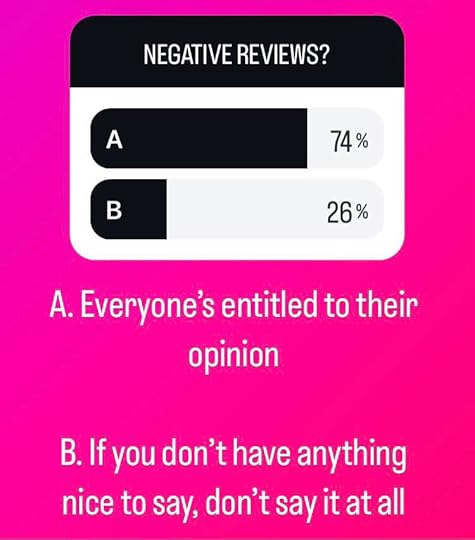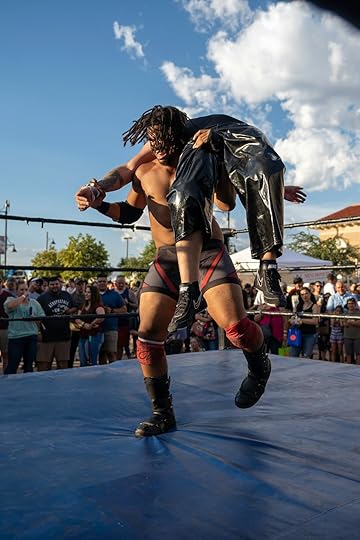AITA? To One-Star, or Not To One-Star

Receiving a negative review for a book can be a challenging experience for any author. I know I have felt disheartened or defensive when faced with criticism, especially after pouring so much effort, creativity, and time into my work. On the other hand, as a reader, I feel a sense of responsibility to provide my honest opinion—even if that means giving a one-star review.
Before you continue readingLet me preface by saying that I only give one-star reviews to books that are so bad that I can’t finish them. Even if I thought a book was horrible, if I could still read it all the way to the end, I will give it two stars.
Okay, so…I recently finished a poetry collection that was gifted to me. (For this article, I will refer to it as “the book” and its author simply as “the author.”) The sentiment was genuine as the collection centered around grief and my two poetry collections Survived By: A Memoir in Verse + Other Poems and Mother, (v) also center around grief. But this book was not for me. Deplete of any specificity, each poem provided a generalism about grief with little to no descriptive language, metaphor, or imagery.
Before writing this article, I donated my copy of the book, but going on the author’s Instagram page, one example of a poem is
“every cell in my body
is mourning you.”
That’s it. That’s the poem. And this style of poetry is just not my thing.
That’s not to say I can’t appreciate bite-sized poems. I can! W.S. Merwin’s “Separation” is a masterpiece in my mind:

One of my favorite poems.
Anyway, I left a one-star review for the book. Here it is:And I thought my review was very fair!DNF not a fan of “insta-poetry,” but if that is your jam, then you’d probably enjoy it. To me, each poem says something generic and so lacks the kind of specificity that builds connection with a reader. Ok, grief is hard. Why? How does the poet/speaker know grief? What happened specifically? I want to know the story behind the sentiment. I don’t need to be fed dozens of pages of generalisms on grief. I know grief is hard. Why was grief hard for *you*? Take me on the journey. Show me what caused your grief. There was also zero variation in form and no unique use of enjambment—that I discerned anyway. But again, this style of writing à la Rupi Kaur, Amanda Lovelace, and the like is really popular, so readers who enjoy that style of writing will likely get more enjoyment out of it than I did. Sorry :(
I didn’t one-star the book and just leave it, and I didn’t one-star the book and write “This is literally one of the worst collections on grief and maybe of all time that I have ever read.” (Which is how I really felt/feel!) I wrote why exactly it wasn’t for me so that people who do like that style of poetry can know that they would probably enjoy it.
So when a fan of the author’s popped into my DMs a month after leaving the review, I was caught off guard.
I saw your comment on [the author]’s book on Goodreads. I responded to it. It really stuck with me how unnecessary and kinda cruel it was 😞 In a world where women should be building each other up, it reflects very poorly on you to write something so negative on a fellow author’s book… makes me wonder if you are a very unhappy person 😞 If that’s the case, I’m sorry, and I hope you find some peace in life… if not, maybe reflect upon your motives for writing it? Not only do you insult her but also her readers.
Oh my god, what?!
And the thing is, I’m not a very unhappy person. In fact, my life is GREAT right now. I just fulfilled my dream of having a child. My partner and I are in the best relationship I’ve ever had. My second book was published earlier this year. I would love some financial stability in my life and am struggling with some internalized fatphobia in my post-partum body, but really… compared to other eras in my life… I am experiencing a golden age.
 Photo by Sasha Freemind on Unsplash
Photo by Sasha Freemind on UnsplashSo I did reflect on my motives for writing it.
And I took to social mediaI asked my writer friends how they felt about giving negative reviews. I created a poll in my story. “What are your opinions on giving negative reviews?” I asked. “A. Everyone’s entitled to their opinion. Or B. If you have nothing nice to say, don’t say it at all. Or is there a gray area?”

One writer friend wrote, “People take shit too fucking personal with reviews… I mean you are bound to get a mix of people’s different opinions.”
Another writer friend wrote,
I think bad reviews are a part of the review process. But they need to be good bad reviews. Like the person actually read the book, they can articulate why and where the book fell short for them… A bad review shouldn’t be “this book fucking sucked, I didn’t even finish, and the author is stupid.” That helps no one.
I am no stranger to receiving negative feedback either! One guy wrote of my poetry, (one second while I copy and paste the direct quote) “how many poems do i have to read about dying parents and cancer? poetry is supposed to read well. this is just words.”
LOL.
And I agree with my writer friend. Bad reviews are a part of the review process. If you’re a professional writer and you’re not open to criticism, then you’re in the wrong industry, my dude. That’s why I can read “how many poems do i have to read about dying parents and cancer?” and laugh! That’s literally what my entire book Survived By is about… my father dying of cancer… if you came for poems about walking barefoot in the grass, you’ve come to the wrong place :-)
A few writer friends, however, felt that leaving bad reviews was bad karma.
One writer friend said,
I tend to keep my negative reviews to myself or share what was meaningful to me (even if I didn’t/don’t love the work). For me, leaving negative reviews isn’t productive or helpful and I find that I feel more connected to the writerly community when I celebrate what I do love.
Another friend who is a professional book reviewer wrote, “On my posts I do not do bad reviews and save them for [social media] stories, but even then I usually just say ‘DNF’…”
I shared my one-star review and the story of the disgruntled fan with respondents to my poll, and received mostly validation.
“Your review wasn’t unnecessary or cruel—you challenged her to write deeper. You focused on the craft,” one friend said.
But another pointed out that referring to poetry as “Insta-poetry” was derogatory and a slap in the face.
It was?! I honestly didn’t mean it insultingly. I thought that was the genre people used to describe that style of writing. I didn’t ask that friend, but I’m going to ask now… if not “Insta-poetry,” how else would one describe the style of writing that is written by Rupi Kaur, Amanda Lovelace, Pierre Alex Jeanty, etc?
I would also write that “traditional poetry” à la Keats, Whitman, Frost, Donne, etc. is also not for me. I absolutely hate rhyming and metered poetry, probably even more than I hate Insta-poetry generalisms. But I don’t think anyone would be offended by my referring to it as “traditional.” IDK.
After polling and interviewing my writer friends, I decided to ask the fan directly, hoping that I wouldn’t start an all-out WWE brawl. Photo by Jason Pofahl on Unsplash
Photo by Jason Pofahl on UnsplashTo my relief, the conversation took a stark turn for the better!
Hi [fan], I've been thinking a lot about your message, and so have some follow up questions. I actually am very happy in my life, and you wrote if I am not really unhappy in my life to reflect upon my motives for writing a negative review on [the author]'s book. So I did. And it's merely because it's one of the worst poetry collections on grief and maybe ever that I have read. And I'm not trying to be mean by saying that. It literally is. I am a professional writer and editor. It is literally my job to read poetry manuscripts and to provide feedback on how to strengthen them. I have done this professionally for multiple entities as well as independently. So, I read dozens of poetry manuscripts every year. If you look at my Goodreads page, you’ll see I have read over 700 books on Goodreads, and I write reviews on most of them. Some reviews are glowing because I absolutely loved a book. And others are not. I am honest in my opinions. I write lots of 5-star reviews, and probably most of them are for female authors and poets. It's not like I'm some catty, petty, jealous female author who tears other female authors down because I'm threatened by them or something. I leave lots of 5-star reviews. [The author]'s isn't one of them simply because I really disliked it. I actually felt like my one-star review for [the author]'s book *WAS* nice. I stated specifically what about it I didn't like. I didn't write a one-star review and just leave it. I didn't write a one-star review and write "this is literally one of the worst collections of poetry I have ever read." To me *that* would have been cruel. But to say the specific reasons why the collection didn't resonate with me and to also say "hey I didn't like this, but if you like this style of poetry then you would probably like it" was very fair, I thought. I'm not sure how it was "insulting." And I am also very confused why it deserved such an outpouring of hate from you. Was it just because I really disliked something that you really liked? So *you* feel insulted because you liked it? I also really dislike… Mary Oliver's poetry. Her collection Dog Songs is another one of the worst collections I have ever read and it won the Pulitzer….
On Goodreads, I actually wrote back to someone who left a one-star review on my friend Laura's book that centers around grieving her dad who passed away in a car accident. The person wrote something along the lines of "I hope writing this book brought her some healing, but I think she only wrote this for the publicity and attention." Like, what?! It's one thing to criticize someone's work, but it's another thing to question someone's integrity when you know nothing about the person at all. That person has since deleted their review.
My one-star review said nothing about [the author] as a person either. So I’m really confused as to how it could have been considered "cruel."
So my follow-up questions are: In your opinion, is it wrong to leave a one-star review at all? Why, if so? In your opinion, how could I re-write my negative review in a kinder way while still sharing the same sentiment: that I don't like insta-poetry. I don't like poetry that is all generalizations without any specificity, that I didn't connect with the content because of those reasons, and I don't like poetry that doesn't use enjambment or interesting line breaks and is all left justified aligned?
I am genuinely asking for a suggestion and am willing to alter my review while also staying authentic to my true feelings.
Thanks Anne Marie for this thoughtful response. You raise some interesting points! I’m sorry you felt that you received an “out pouring of hate” from me. That’s just not who I am or would ever want to be…
I’m still unsure if you needed to say that the poetry wasn’t going to connect with its audience when you didn’t even finish it…
Your point about should people leave one star reviews is a good one…? I guess I feel so strongly about this book and how much it’s resonated with my grief experience that your words in your review (and this message) only serve to disrupt/undo that and I guess I don’t have the resilience I’d like to have at the moment.
Sorry if you felt hated though.. your review does read as someone who is looking for details to someone’s trauma and that felt unfair… but can see that it’s more than that.
Thanks again for your response x
So I went back and revised my review, letting people know that I DNF-ed at 50% and changing “To me, each poem says something generic and so lacks the kind of specificity that builds connection with a reader” to “To Me, each poem says something generic and so lacks the kind of specificity that allows me to build a connection with it.” And then added examples of grief poetry that does allow me to build a connection with it because it is specific and does take me along on the journey.
TL;DR-I was affirmed that it is okay to leave a one-star review for work that doesn’t resonate and when leaving a one-star review, it is better to explain that one star rather than just leaving one star with no explanation.
-I want to encourage other reviewers to keep their one-star reviews about the work itself and only your response to it. Leave personal commentary about the author themself off of it. (Or if you do criticize the author as a human being, bring your receipts. Write a specific quote that makes you say what you say.)
What do you think?Have you left one-star reviews? Why or why not?
AITA for leaving a one-star review in the first place?
How would you re-write my review to be gentler?
Tell me in the comments!
Alright, that’s all folks! Thanks for reading!Love,Anne MarieCheck me out in the places:Or support me by buying my poetry collection (and please leave a review… even if it’s one-star haha!)



